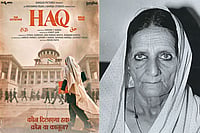The grass is high, the river is low. The lambs are heavy with wool. The cow parsley needs cutting. The growing wolf cubs are ever hungry for more food. The rams are being put out with the ewes for tupping. The reservoirs are full. A marriage falters. New liaisons blossom. Teenagers become adults. Twins are born, old Mr Wilson’s hip gives away, Lynsey has come back from London without an explanation. And so life goes on.
McGregor immerses the reader in his story sentence by sentence, chapter by chapter, and soon you are living amidst Miss Carter and Su Cooper and James Broad in this nameless town in the English Midlands. You want to know if Richard Clark and Cathy Harris, who had been childhood friends but drifted apart when Richard went to university and Cathy married Patrick, will come together again now that Patrick is dead. You are worried if Geoff Simmons will have to give up his pottery as he hasn’t sold a single item in the last few months. And how will the neighbours react to the schoolteacher Mr Jones coming back to the village after facing charges of paedophilia?
This beguiling book begins as a mystery novel. A young girl, ‘Rebecca, or Becky or Bex’, who is visiting the village with her parents for the summer, goes missing. The tight-knit rural community looks for her frantically. Police detectives land up, helicopters do searches, divers dive into the reservoirs to look for her, TV channels blare out the incident non-stop, daily press conferences are held. But you soon realise it isn’t a mystery story at all—that is, if you don’t count the everyday mysteries of ordinary lives. The novel has 13 chapters (what’s with the number—the title, the missing girl is 13-years-old), each begins with “At midnight when the year turned...” and goes through each of the following months when plants and flowers, birds and badgers, men and women change colour, form and temperament. This might make it sound as if the book is plotted on an Excel sheet. But the familiarity of the seasons changing, and the curiosity of what the future holds, is both the charm and force of the novel. It begins at the turn of this century and as the years go by things which have taken over our lives are quietly slid in—letters give way to emails, landlines to mobiles, people get information through FaceBook and Twitter, cars become electric.
McGregor employs a languid past tense-passive voice language—is it as a rebellion against all those creative writing classes which are always hard-selling short sentences, aggressive voices and here-and-now tenses? So, conversations don’t happen in direct speech. For INStance, this is an exchange between the childhood friends mentioned earlier: “Having listened to Richard’s list of short-lived pairings, Cathy made the mistake of telling him about Gordon Jackson, years back. Richard was surprised, but he tried to sound understanding. Grief does things to a person, he said, and Cathy held herself back from asking how would he know. She told him in fact it had happened before Patrick’s death. About six months before, she said. And regularly, for a time. I was with him when they called me to the hospital.”
Some families and relationships are etched in great detail and you get involved with them more. Others are a bit sketchy and you don’t care. You live with Austin Cooper and Su Lin Cooper (of Chinese origin), who come to live in their flat above the converted stables right from the time their twin boys are infants to Austin turning 65 by the end of the book. You see the four teenagers who had befriended the missing girl (one is called Deepak) grow from drinking beer at the banks of reservoirs, taking off their shoes and running across the cold water, to going to college, finding jobs, getting into confusing relationships, discovering life, and always coming back to their homes in the village. Some others, like Jane, the lady vicar at the parish, the new schoolteacher Miss Carter, the lamb-farm owner Jackson you get to meet, but they remain mere acquaintances.
Reservoir 13 ebbs and falls, the people in it largely go through life with wit and warmth, there are a few gentle upheavals and hiccups, but, as in life, the most interesting bits are precisely the daily humdrum of living, our little successes and disappointments. Last week, the book got knocked off from the Booker shortlist. A pity.



























